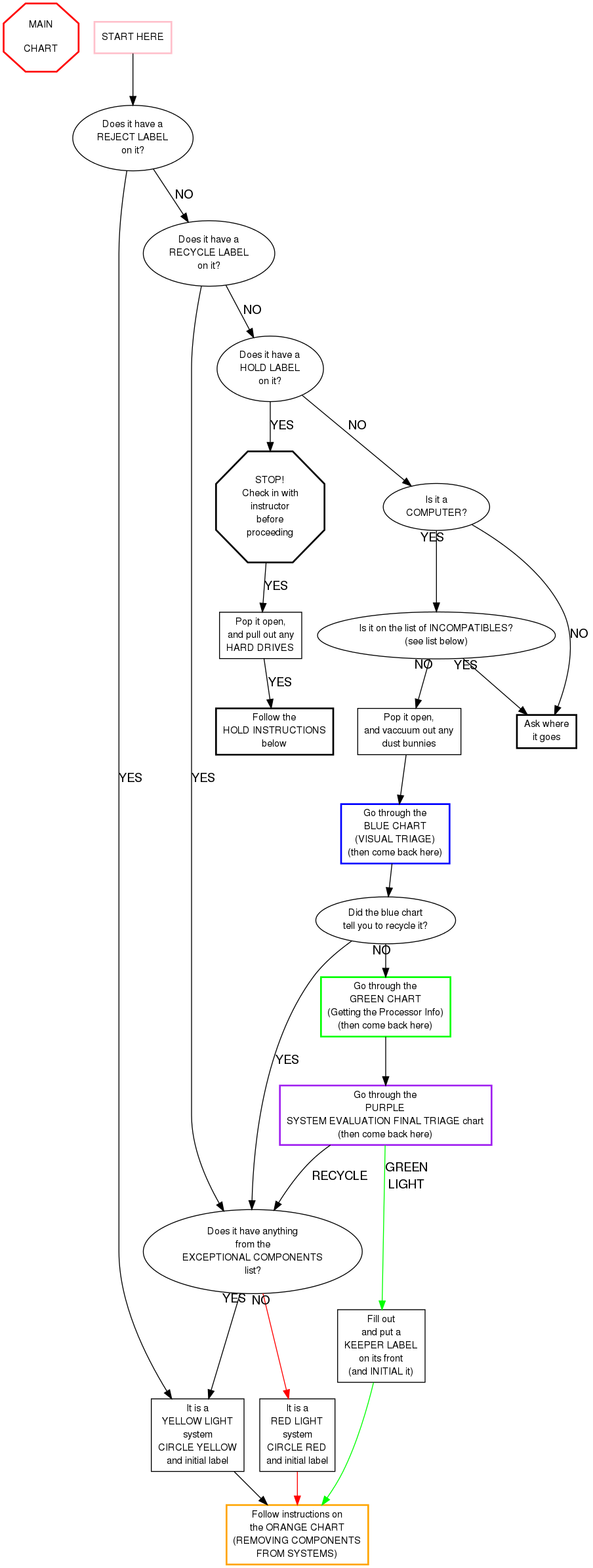Difference between revisions of "System Evaluation Overview"
Jump to navigation
Jump to search

Elizabethwt (talk | contribs) |
|||
| Line 19: | Line 19: | ||
computer [label="Is it a\nCOMPUTER?"] | computer [label="Is it a\nCOMPUTER?"] | ||
circled [label="Is either\nRED LIGHT or\nYELLOW LIGHT\ncircled?"] | circled [label="Is either\nRED LIGHT or\nYELLOW LIGHT\ncircled?"] | ||
| − | incompatible [label="Is it on the list\ | + | incompatible [label="Is it on the list\nof INCOMPATIBLES?\n(see list below)"] |
labelit [label="Fill out\nand put a\nKEEPER LABEL\non its front\n(and INITIAL it)", shape="box"] | labelit [label="Fill out\nand put a\nKEEPER LABEL\non its front\n(and INITIAL it)", shape="box"] | ||
initial [label="Put your INITIALS \non the label", shape="box"] | initial [label="Put your INITIALS \non the label", shape="box"] | ||
| Line 93: | Line 93: | ||
** Circle AMD in the "Proc Type" section | ** Circle AMD in the "Proc Type" section | ||
** Write the processor '''model number''' in the "Processor Information" area | ** Write the processor '''model number''' in the "Processor Information" area | ||
| − | * For Intel and other chips: | + | * For Intel and other chips: |
** Circle the processor type (or write next to "Other") | ** Circle the processor type (or write next to "Other") | ||
** Write the processor '''speed''' in the "Processor Information" area | ** Write the processor '''speed''' in the "Processor Information" area | ||
| Line 103: | Line 103: | ||
* If there are any PCIe slots, circle '''PCI-e''' | * If there are any PCIe slots, circle '''PCI-e''' | ||
* If there is an AGP slot, circle '''AGP''' | * If there is an AGP slot, circle '''AGP''' | ||
| − | * Remember to put your ''' | + | * Remember to put your '''initials''' in the appropriate box |
==Incompatibles== | ==Incompatibles== | ||
| Line 113: | Line 113: | ||
** PowerComputing | ** PowerComputing | ||
** Umax Supermac | ** Umax Supermac | ||
| − | * | + | * Commodore |
* DEC (Digital Equipment Corporation) | * DEC (Digital Equipment Corporation) | ||
* Sun | * Sun | ||
Revision as of 14:51, 12 March 2010
MAIN Chart

Filling out a KEEPER label
- If there are any SDRAM slots, count and circle the correct number
- Do the same for DDR slots
- (Some systems have both DDR and SDRAM slots.)
- For AMD chips:
- Circle AMD in the "Proc Type" section
- Write the processor model number in the "Processor Information" area
- For Intel and other chips:
- Circle the processor type (or write next to "Other")
- Write the processor speed in the "Processor Information" area
- If there are any SATA connectors on the motherboard circle the appropriate number
- If there are any IDE connectors on the motherboard circle the appropriate number
- If the system can take more than one processor, check the Multi Proc Capable box
- If the system has a dual core processor, check the Dual Core box
- If the system did not POST successfully, check the Did not POST box
- If there are any PCIe slots, circle PCI-e
- If there is an AGP slot, circle AGP
- Remember to put your initials in the appropriate box
Incompatibles
- Amiga
- Apple, etc:
- Mac
- Radius
- PowerPC
- PowerComputing
- Umax Supermac
- Commodore
- DEC (Digital Equipment Corporation)
- Sun
- Silicon Graphics (SGI)
- Indy (they're blue)
- anything with the label RISC on it
- High Speed or Ultra Speed CD RW
- They must have a standard 5.25" rectangular faceplate and not be laptop-sized.
- A drive is only High Speed or Ultra Speed if it literally says "High Speed" or "Ultra Speed" to the right of the "Compact Disc" label.
- DVD Drive
- They must have a standard 5.25" rectangular faceplate and not be laptop-sized.
- Front side card readers, only if it includes a cable
- Gigabit ethernet card (Network Card marked 1000)
- Wireless card
- Power supply with a SATA connector
- Molex to SATA power supply adapter
- Molex to 6-pin power supply adapter
- Motherboard with SATA connector(s)
- A really cool case that some geeky kid would drool over
There is no need to actually pull these components out at this point. (You will be instructed to pull them later on.)
